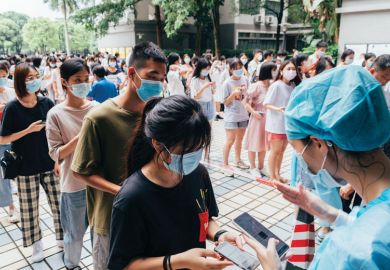Students at Taiwan’s most prestigious university will be able to take up to three “mental health days” per semester, under a new policy taking effect this autumn.
As the academic year begins this week, for the first time National Taiwan University (NTU) will offer students the possibility of taking leave for mental health issues without providing proof of illness, local media reported.
Students requesting time off will be able to do so on the same day by filling out an online form.
While it is not the first to implement such a policy – nearly a dozen Taiwanese institutions, including the National Taiwan Normal University, National Chengchi University and Taipei Medical University, have put in place similar provisions – NTU becomes the highest-profile university to have done so.
NTU president Chen Wen-Chang, who took office in January, alluded to the policy during his speech in this week’s start-of-term ceremony.
“While doing my PhD, working and dealing with my family, I faced a lot of setbacks,” he said. “Cultivating resilience in the face of setbacks is something we all must learn.”
The move comes as Taipei has acknowledged the issue of youth suicide. In 2020, Taiwan’s Department of Health noted that suicides from age 15 to 24 had risen by 64 per cent, despite a slight decline in overall deaths by suicide.
Chan Sheng-Ju, vice-president for student affairs at National Chung Cheng University, told Times Higher Education that NTU’s move illustrates the “critical situation that university students have faced in a systematic way, particularly at the elite universities”.
He called mental health days a “good compromise” to help out students in the short term, saying his own university was currently undergoing “serious discussion” on how to facilitate mental health leave.
Professor Chan noted that there are “several measures” in place preventing abuse of the system – for instance, a note in students’ files in their university counselling centre. After leave, students are expected to contact counselling services for advice.
NTU students speaking to reporters backed its new policy, saying that issues such as relationship problems could be very disruptive to studies in the short term.
Chuang Chih-cheng, the head of the NTU Student Association, welcomed the move.
“It’s an acknowledgement that everyone is fragile and that everyone is valued regardless of physical or mental need,” he told media.
Mr Chuang indicated the move might help students be more forthright with their professors if they feel like they need a break.
“It’s no longer the case that students have to skip class when they’re feeling down,” he said.
An NTU spokesperson told THE that its initiative “aligns with our broader efforts to cultivate a campus culture that values mental health, reduces stigma, and encourages open conversations about well-being”.
“We trust our students to use mental health days responsibly. The emphasis here is on supporting a culture of open communication between students and their professors.”
Register to continue
Why register?
- Registration is free and only takes a moment
- Once registered, you can read 3 articles a month
- Sign up for our newsletter
Subscribe
Or subscribe for unlimited access to:
- Unlimited access to news, views, insights & reviews
- Digital editions
- Digital access to THE’s university and college rankings analysis
Already registered or a current subscriber?








